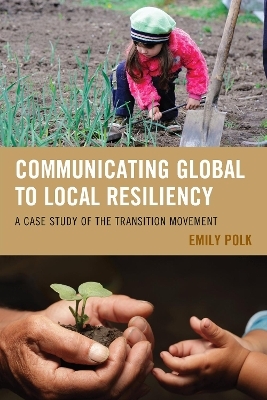
Communicating Global to Local Resiliency
Lexington Books (Verlag)
978-0-7391-9853-7 (ISBN)
This book explores the communication processes of the Transition Movement, a community-led global social movement, as it was adapted in a local context. First it analyzes how the movement’s grand narratives of responding to “climate change” and creating greater “resiliency” were communicated into local community-based stories, responses, and actions in the Transition Town of Amherst, Massachusetts. Second, it seeks to understand the multilayered communication processes that facilitate these actions toward sustainable social change. Transition Amherst developed and/or supported projects that addressed reducing dependency on peak-oil, creating community-based-local economies, supporting sustainable food production and consumption, and participating in more efficient transportation, among others. The popularity of the model coincides with an increase in the interest in and use of the term “sustainability” by media, academics and policymakers around the world, and an increase in the global use of digital technology as a resource for information gathering and sharing. Thus this book situates itself at the intersections of a global environmental and economic crisis, the popularization of the term “sustainability,” and an increasingly digitized and networked global society in order to better understand how social change is contextualized and facilitated in a local community via a global network. This book is the first comprehensive analysis of the ways in which the theories of Transition are applied over an extended period of time in practice, on the ground in a Transition town.
Emily Polk is lecturer in the Program in Writing and Rhetoric at Stanford University.
Chapter 1: Introduction to the Transition Movement: Why is it important to study it?
Chapter 2: Background of study
Chapter 3: Sustainability, development communication, and social movements
Chapter 4: Framing the communicative relationship(s) mediated within the movement
Chapter 5: Methodology
Chapter 6: The appeal of the glocal narrative(s)
Chapter 7: Measuring and communicating impacts
Chapter 8: The multiscalar role of ideology and culture in Transition
Chapter 9: Are Transition Towns sustainable?
Chapter 10: The value of diversity: the role of race, class, and age
Chapter 11: Digital communication, technology, and Transition
Chapter 12: Conclusion and recommendations
| Reihe/Serie | Communication, Globalization, and Cultural Identity |
|---|---|
| Verlagsort | Lanham, MD |
| Sprache | englisch |
| Maße | 161 x 231 mm |
| Gewicht | 440 g |
| Themenwelt | Sozialwissenschaften ► Kommunikation / Medien ► Kommunikationswissenschaft |
| Sozialwissenschaften ► Soziologie | |
| Wirtschaft ► Volkswirtschaftslehre | |
| ISBN-10 | 0-7391-9853-X / 073919853X |
| ISBN-13 | 978-0-7391-9853-7 / 9780739198537 |
| Zustand | Neuware |
| Haben Sie eine Frage zum Produkt? |
aus dem Bereich


